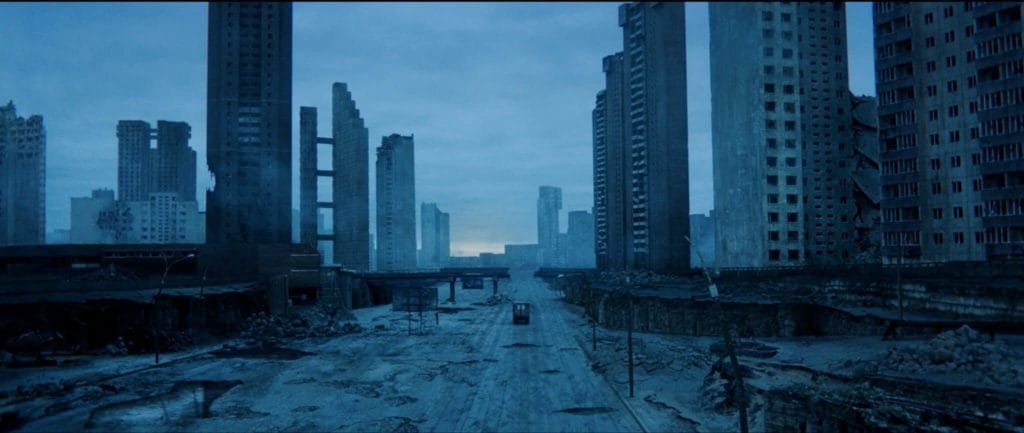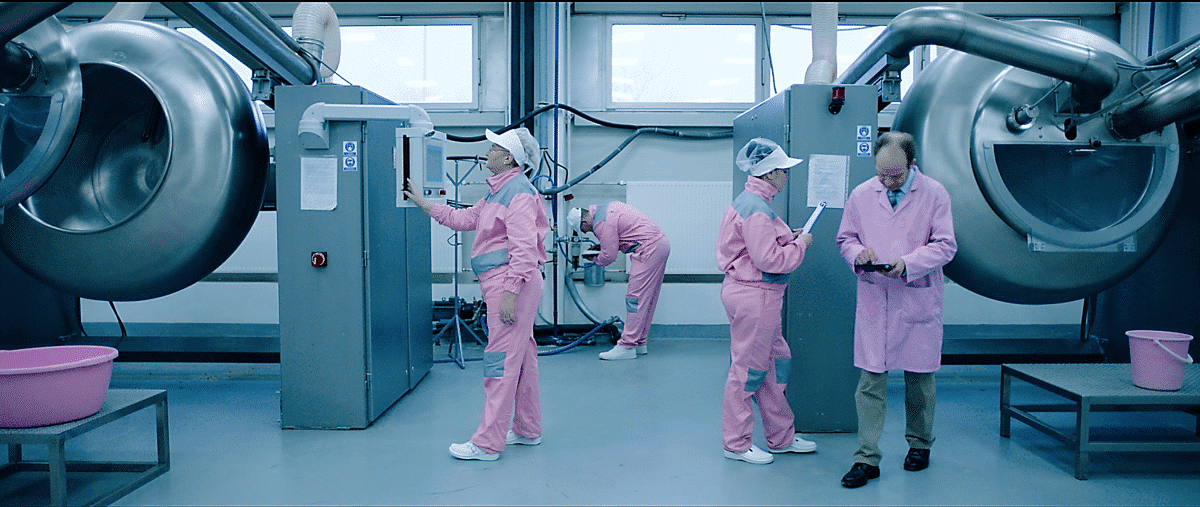
I think I can be forgiven for assuming that Undergods (2020) was another dystopian sci-fi of a certain kind. This isn’t just due to the promo info; its opening scenes feel familiar, with shots of dilapidated buildings, abundant filth and scarce, seemingly feral people; the aesthetic is just what you’d expect from a world post-bomb, -disease or -famine – the likes of which we’ve seen elsewhere on-screen. And the first two characters we meet could quite happily belong to any such world: known only by their initials, K (Johann Myers) and Z (Géza Röhrig) make ends meet by collecting dead bodies from the streets, which they sell on as ‘meat’. It’s a job they seem reasonably happy to be doing and they seem to enjoy each other’s company – hey, gallows humour and all that. As they drive, they begin to exchange stories…and that’s as much of a framing device as you get in Undergods, which turns out to be a stylish, if distended run of fragmentary narratives, some pertaining to what seems to be the same dystopian streets and some belonging elsewhere, though all seem to have the same bleak, often gruelling meanness of spirit in common. In itself, that’s quite an accomplishment.

As K and Z chat, they begin to recount dreams and ideas they’ve had: the first of these takes us to an apartment block where, compared to life for K and Z themselves, seems fairly bearable, at least in terms of basics like food to eat and somewhere to sleep. Maslow’s hierarchy of needs has a few levels on K and Z’s world here. We meet a couple, Ron (Michael Gould) and wife Ruth (Hayley Carmichael) who are disturbed at dinner by an upstairs neighbour who has, it seems, locked himself out. You could be forgiven for thinking Ruth is quite keen to have any other company than her husband, so she suggests they let him in and let him spend the night. One night turns into several; Ron goes backwards and forwards on how to dislodge this stranger from his home (something of a theme in Undergods, if we’re pressed to suggest one) and his decision leads to something which a prospective new neighbour would probably choose not to see. In one of the film’s moments of dipping out of the story, providing us with a new narrator, this new neighbour begins telling a story of his own; it’s clearly no accident that the next story foregrounds a copy of Tales of Hoffman, as the film clearly aims to emulate that author’s fragmentary use of plot markers and resolutions. There are four stories in all, taking in crooked merchants, wronged foreigners, amnesiac spouses, toxic self-help tomes and one of the most excruciating work party scenes since the last one (hey, they’re easy to get right).
This all takes place in a kind of somewhere/anywhere in the continent of Europe, though for all the world looking like the worst of the former Eastern Bloc, at least whenever we get a good look at the skyline. As a matter of fact, the film was shot in Serbia with a very cosmopolitan cast. Against this backdrop, we have a real mixture of European names, some British, some Northern European. Elsewhere, the housing is minimalistic and modern (if belonging to the wealthy) or achingly normal (if belonging to the – at first – achingly normal). This kind of timelessness and rootlessness is a common choice for filmmakers of late. Here though, it works fairly well, and doesn’t feel like it’s closed off a sense of place and time simply for the sake of it. If you like your cinema to look cold, with a palette of greys and blues which would put the New French Extremity movement to shame, then you’ll very much enjoy Undergods: the stark red of the opening title shows a clear understanding of arresting visuals and how to blend elements together, though one of the other common calling cards of today’s indie cinema – a booming electro soundtrack – is far too high in the mix, drowning out speech whenever one overlays the other, which is a minor irritation.
Undergods clearly sets out to cultivate nightmarishness and it does achieve this, cutting in its blaring audio, static shots and quick edits whilst moving in a way which makes many scenes and moments feel like non-sequiturs. It features a very few moments of interaction between its stories, but any sense of a distinct framework is soon dashed, and even in and of themselves, stories lack the expected moments of resolution; some aspects of the film are very engaging, and as an atmospheric venture this is a successful film, but the lack of narrative pay-off does feel unsatisfying – even whilst you accept that the film has made some bold choices by going its own way. If it resembles anything at all then it would be Taxidermia (2006), though again, the latter film has a clearer thread linking its own grim narratives together. Undergods is a couple of stages removed from that, but in terms of the gritty discomfort and oddness it brings, it succeeds. It’s just that its level of detachment from the conventions of tale-telling will not suit every viewer.
Undergods (2020) will be available in theatres and On Demand from May 7th.
